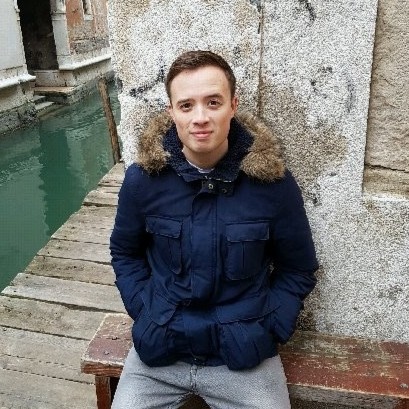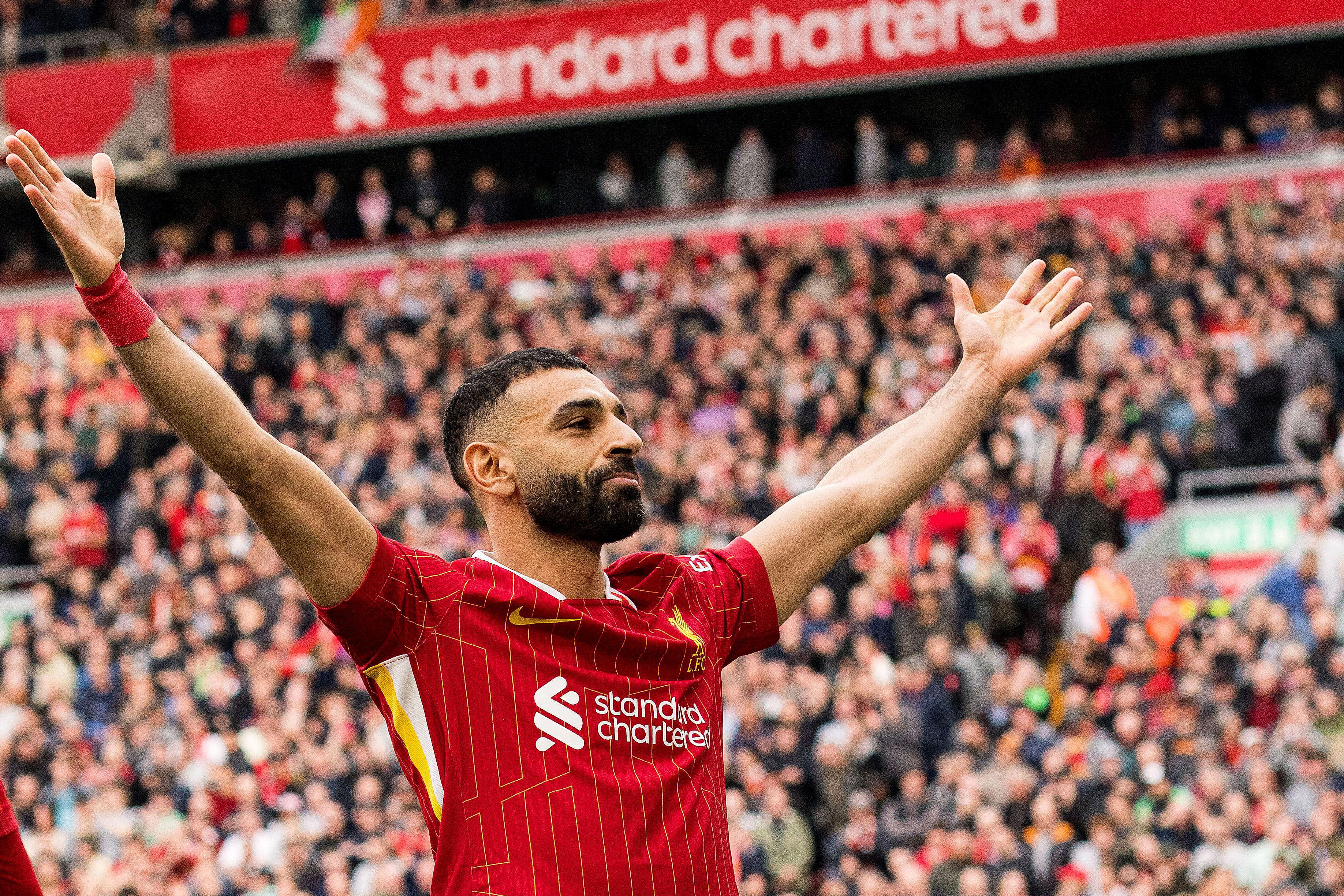FourFourTwo’s 100 most influential people in football right now: 30-21
Our approach to the top 20 includes the man who thought he'd suffered the world's most expensive divorce, Roman Abramovich's right-hand woman, and the bloke partly responsible for pouring millions into the Premier League coffers
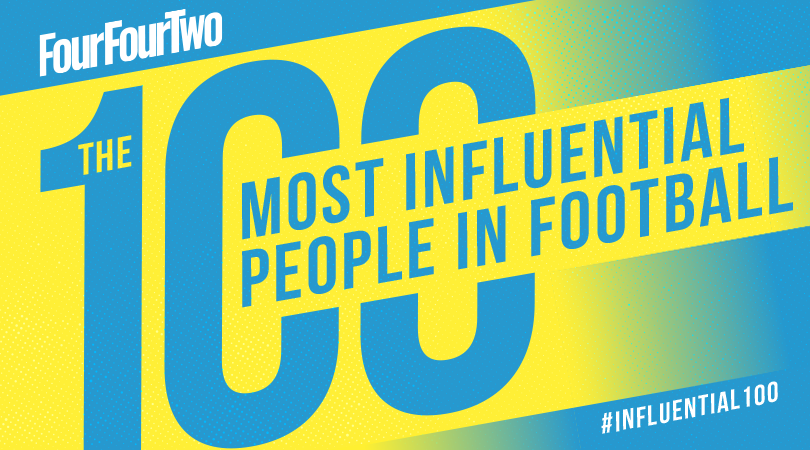
Words: Alex Hess, Emyr Price, Seb Stafford-Bloor, Amit Katwala.
30. Dmitry Rybolovlev
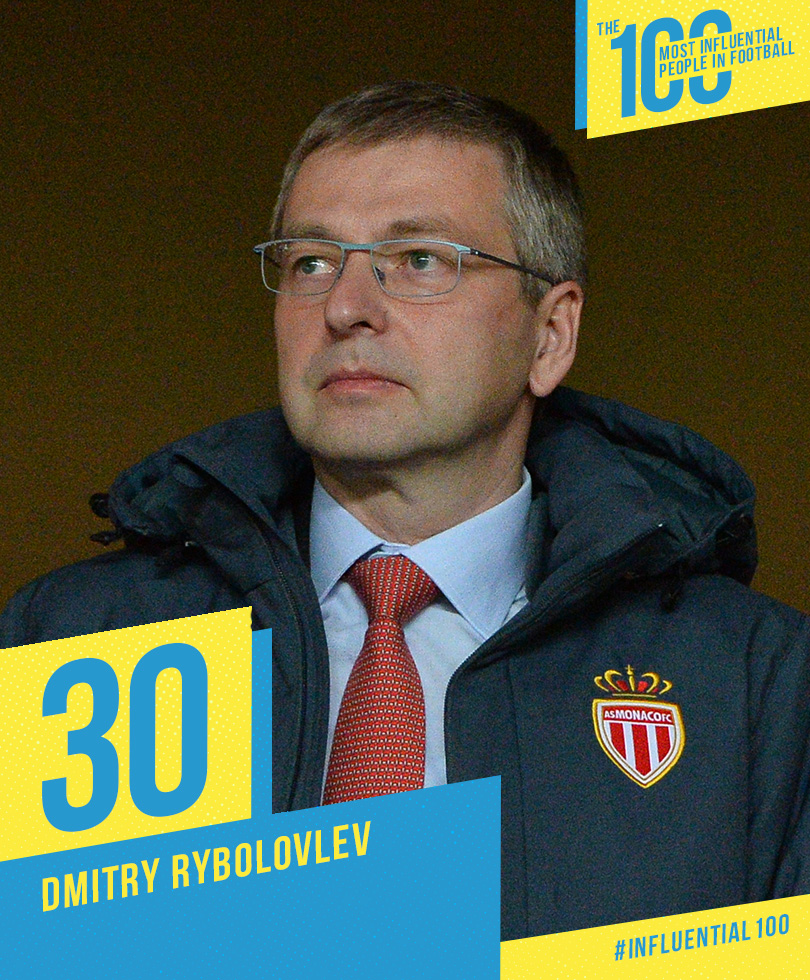
Another beneficiary from the free-for-all privatisation project of post-Soviet Russia, Rybolovlev (net worth: $7.3bn; value of personal art collection: $2bn) made his fortune from producing potassium fertiliser.
In 2011 he decided to buy a football club, opting for the one set among the casinos, yachts and generous tax rates of Monte Carlo. Back then, Monaco were a fallen giant in France’s second tier; six years later, they sit proudly as imminent French champions, and reached the Champions League semi-finals one of Europe’s most exciting young teams.
Perhaps not surprisingly, his wealth has not come without significant controversies. His company has been repeatedly named by environmentalists as repeat offenders regarding industrial-scale pollution, and in 1996 he was jailed for providing the weapons with which one of his business associates was murdered – a crime for which he was later set free after a witness recanted his testimony.
Last year the Football Leaks website alleged him to have been tampering with his player’s market prices through illegal third-party ownership strategies. And in March this year, a spokesperson for Rybolovlev was forced to publicly deny any financial connection between he and Donald Trump, whose possible links to Russian figures are subject to an ongoing FBI inquiry (Rybolovlev’s family trust paid $95m in 2008 to buy a Palm Beach mansion from the then-Apprentice star).
Oddly for a club funded by a sugar daddy, Rybolovlev’s Monaco have excelled amid a period of relative austerity: his early lavishness was curtailed by his protracted and eye-wateringly expensive divorce – originally $4.5bn, reduced to $600m on appeal but later settled for good undisclosed – and the high-flying, high-scoring Monaco of 2017 are remarkable for being a team without any bona fide superstars. But make no mistake: it was Rybolovlev’s millions that got them here. AH
Get FourFourTwo Newsletter
The best features, fun and footballing quizzes, straight to your inbox every week.
29. YouTube
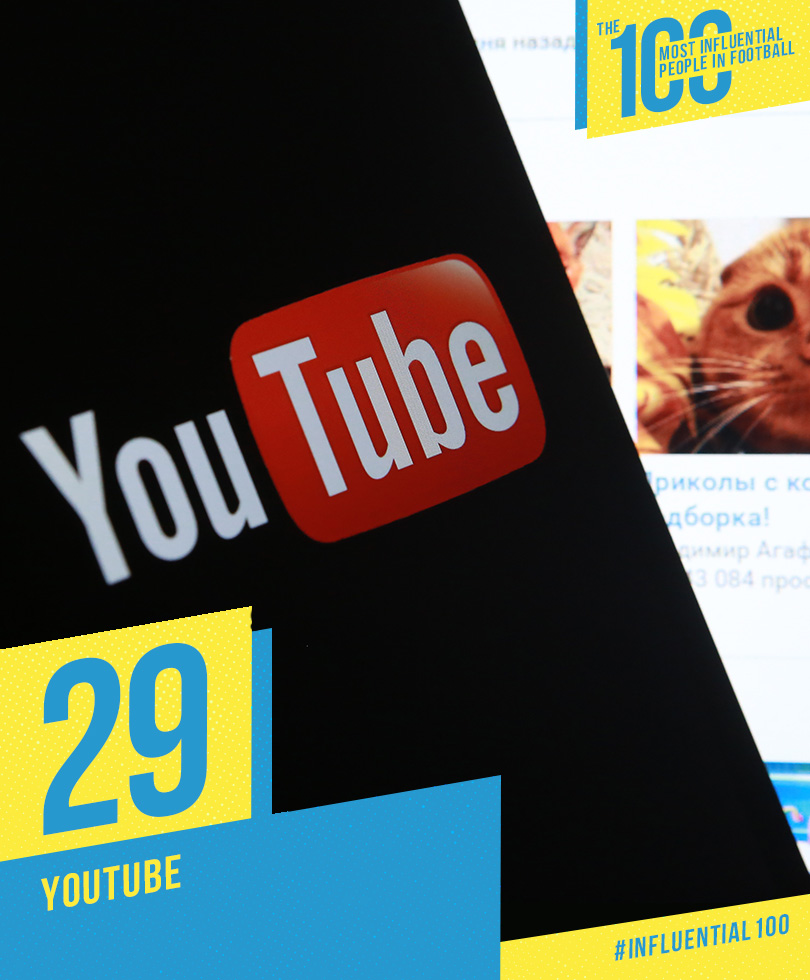
Measuring YouTube's influence on football is relatively straightforward. Just think back to when it didn't exist.
Where in 2006, for instance, would you have found a highlights 'welcome' reels for West Ham’s newest recruits – lads by the names of Carlos Tevez and Javier Mascherano? Those videos would have got 100,000 hits apiece in their first day.
Great for the fans, then, but clubs themselves were unsure how to utilise the service to begin with. It played an integral part in Kevin Keegan's departure from Newcastle in 2008, as he refused a sanction a £2 million deal for Uruguayan Ignacio Gonzalez – a player that then-director of football Dennis Wise had sourced from YouTube without previously having seen play. With Wise forcing the move through, the player arrived, and Keegan duly went.
Nowadays, it's something harnessed by any club worth it's salt on the planet. Manchester City were the British pioneers. According to head of CityTV Michael Russell in 2009, they recognised that: "In terms of growing an audience, there is no better place than Youtube." Today, City have the third-highest number of subscribers for any sporting franchise in the world.
Then there are the YouTube ‘stars’; channels featuring various personalities, skill-based tricksters and gaming gurus who continue to influence a brand new generation of football fans. The game has changed. EP
28. Vitaly Mutko
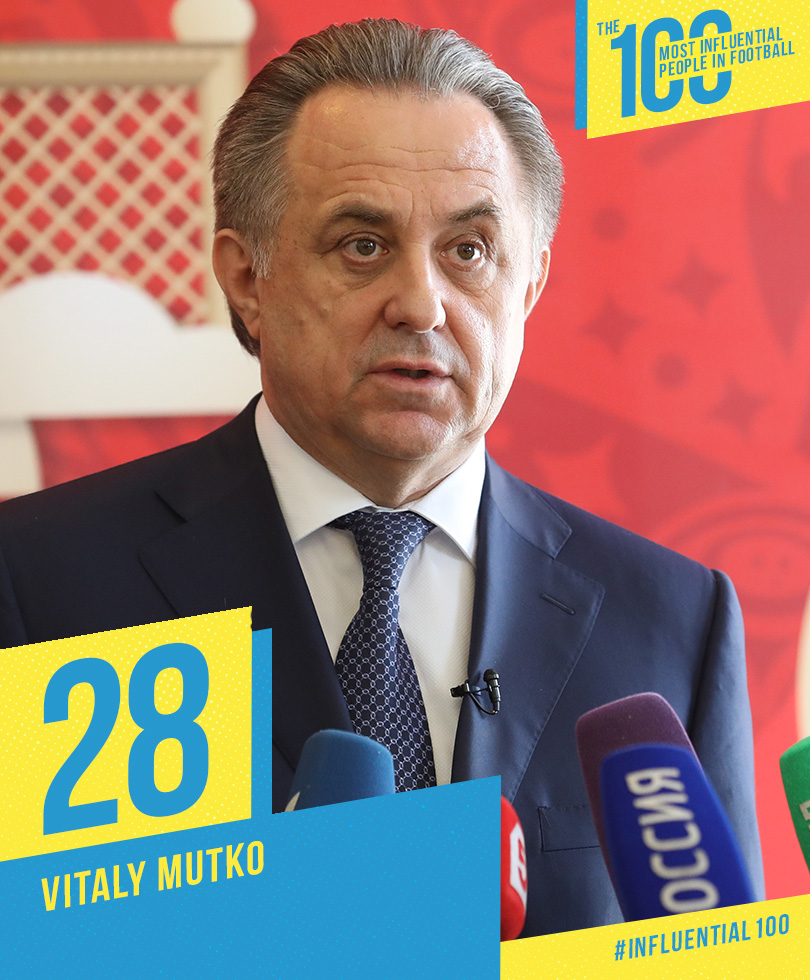
A person of undoubted influence, but whose political career has compromised his football powers. Between 2008 and 2016, Mutko was Russia’s minister of sport, before being promoted to deputy Prime Minister in October.
He’s also the head of the Russian football union but, as of March of this year, FIFA barred his attempts at re-election to their council, citing concerns over political neutrality.
Nevertheless, he remains in charge of his country’s hosting of the 2018 World Cup and will help to shape global perceptions before, during and after the competition.
Russia’s successful bid was suspected to have relied on the “habits” of many former FIFA ExCo members and, unfairly or otherwise, is tainted by association. A successful and peaceful delivery is imperative but, given the myriad issues which challenge Russian football, remains highly optimistic. It’s a mighty challenge. SSB
27. Sheikh Salman bin Ibrahim Al Khalifa
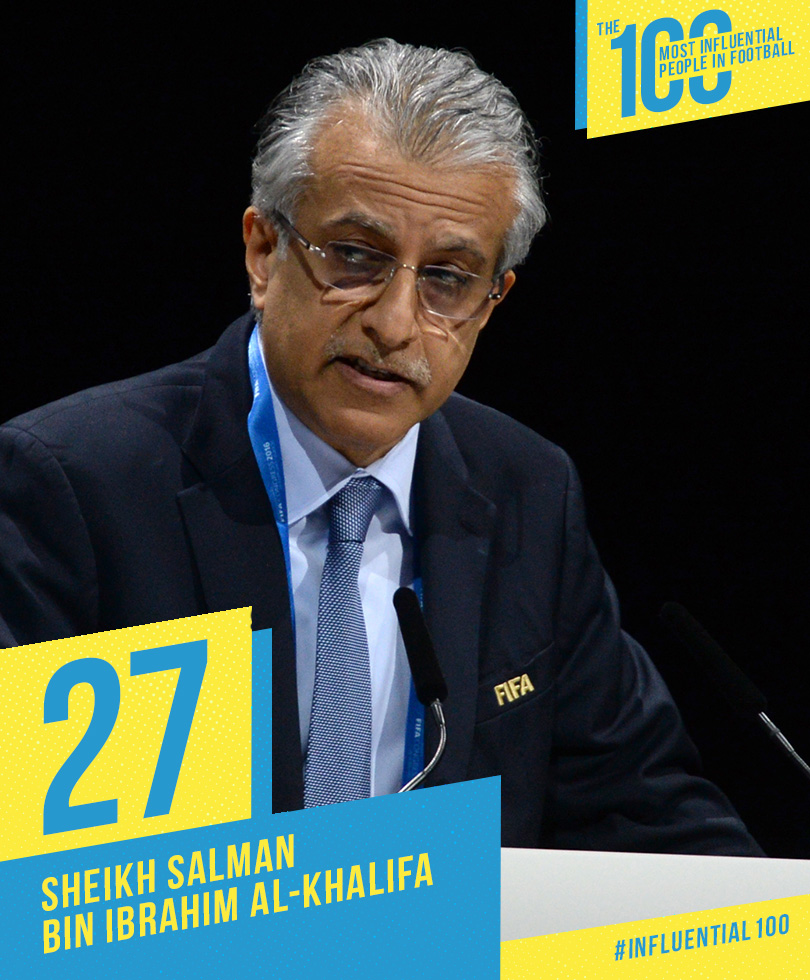
President of both the Asian and the Bahrain Football Associations, and one of Gianni Infantino’s beaten rivals in the 2016 FIFA presidential election.
A controversial figure, Sheikh Salman’s campaign was undermined by repeated accusations of human rights violations in the aftermath of the 2011 pro-democracy protests in Bahrain.
He does, though, hold significant influence nonetheless: in his current role, Salman’s principle focus lies in eradicating match-fixing and general corruption from Asian football. Naturally, he exerts great authority over the Asian Champions League, which he seeks to enhance and diversify, and he will also be a substantial figure in the early delivery stages of the 2022 World Cup (and the competition itself, depending on his re-election and career trajectory). SSB
26. Ahmad Ahmad
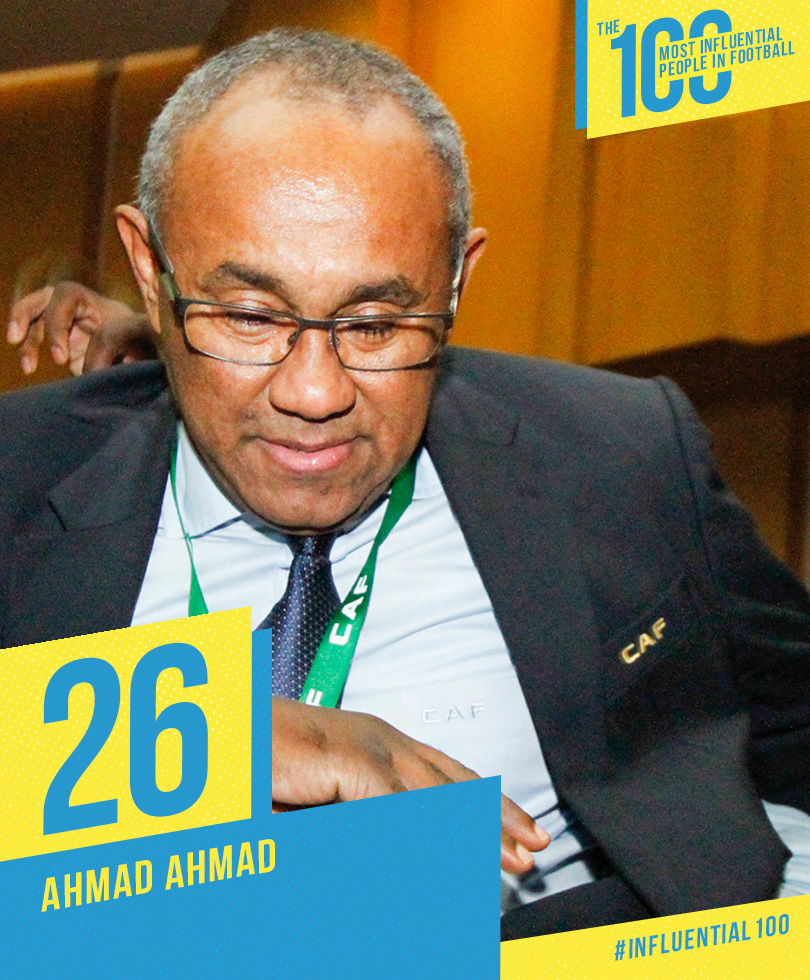
In March, Ahmad – the head of the Madagascan FA – shocked the world by ousting Issa Hayatou and becoming president of the Confederation of African Football (CAF). Cameroonian Hayatou had held the position for 29 years and, quite understandably, his loss is seen as the beginning of a new day for African football.
Ahmad has certainly made the right impression: reform is front and centre of his manifesto and, on taking power in March, he refused to accept a salary for his new position and emphasised the need for transparency across all positions within the federation.
Making promises and delivering upon them may be two different tasks, but Ahmad is evidently not under any illusion as to the scale of the job: he has promised a full review of all CAF competitions – including the Africa Cup of Nations and the African Nations Championship – and has stressed the importance of developing a proper separation of powers within the organisation. SSB
25. Herbert Hainer/Kasper Rorsted
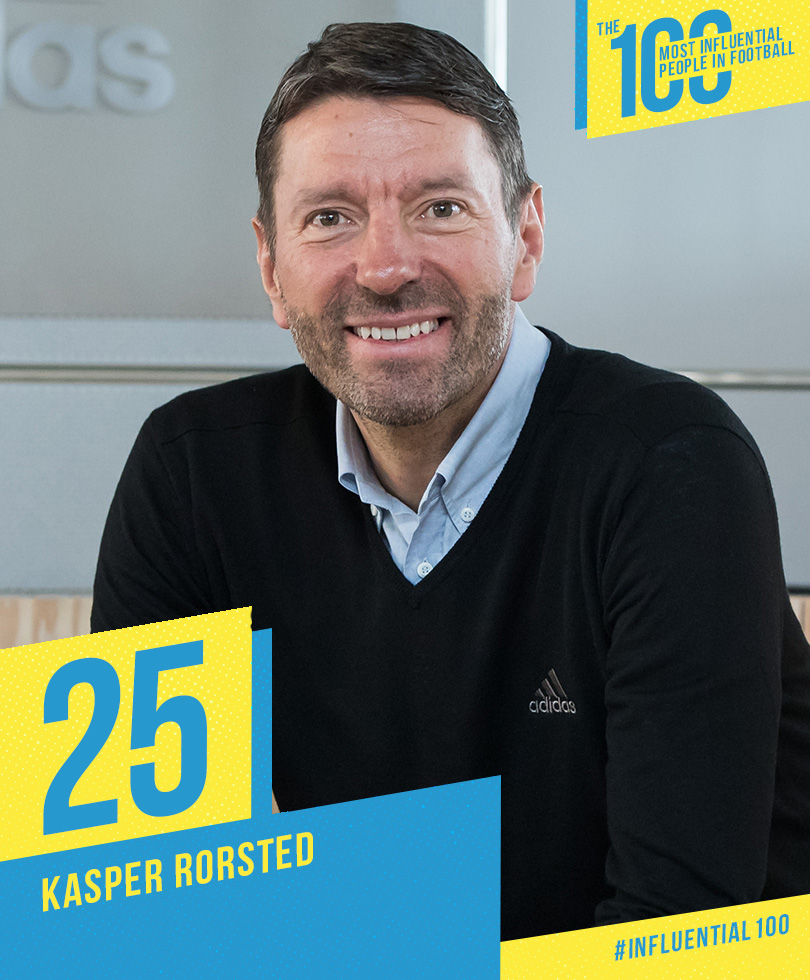
German industrial giants: Adidas, Allianz, Lufthansa - tick. The Motherland's most famous club: Bayern Munich - tick. And a vintage trainer collection (rumoured to be 100+ pairs and counting) to rival the best of them: tick.
Yep, it's all there on Herbert Hainer's CV. As chief executive, he transformed Adidas until his retirement last summer, overseeing market cap growth from $3 billion to $30 billion. And since his appointment in 2003 as vice-chairman on Bayern's advisory board, the club have collected a stunning 10 Bundesliga titles, eight German Cups, four Super Cups, one Champions League crown and one World Club Cup.
He has been replaced at the head of Adidas by Kasper Rorsted, who takes on the tough task of helping the company grow and continue exerting its sizeable influence on football off the field.
His predecessor Heiner’s public criticism of Louis van Gaal at Manchester United in 2016 (“We are satisfied, even if the current playing style is not exactly what we want to see,” he opined ominously) preceded the Dutchman's swift departure a short time later. Coincidence? Maybe. Or maybe not. EP
24. David Gill
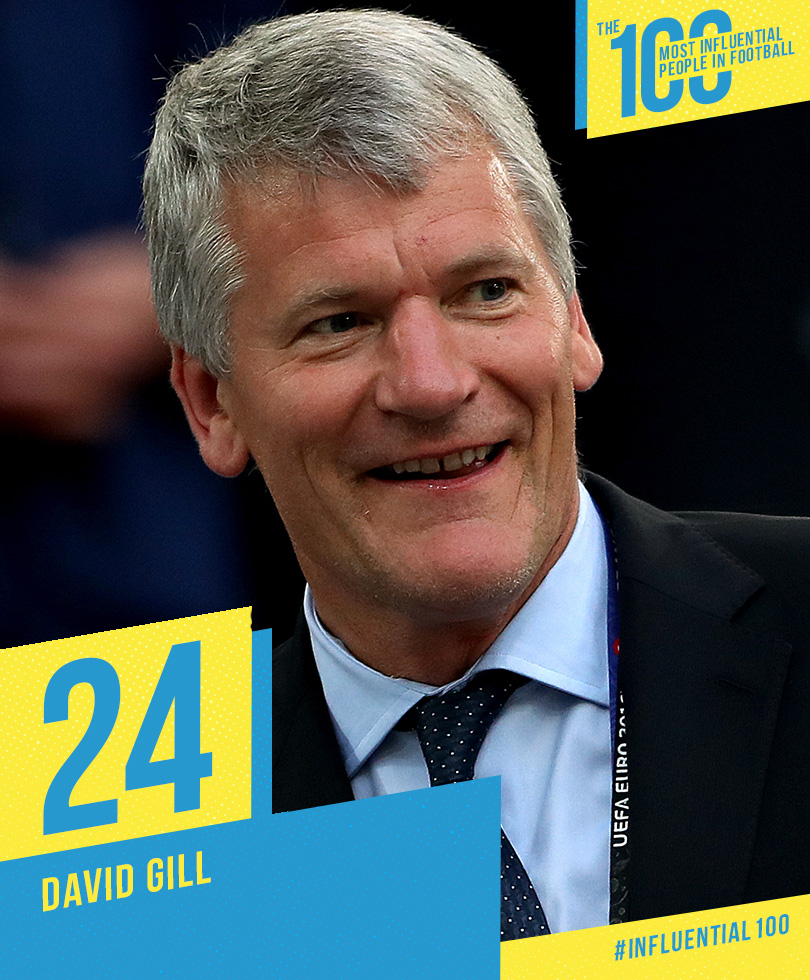
Obviously Alex Ferguson’s departure from Manchester United was a huge blow, but it was arguably matched by David Gill choosing to leave the club at the same time. The 59-year-old served as United’s chief executive for 10 years from 2003, and during his time at the club, United trebled in value to more than £2bn, also winning four Premier League titles, three League Cups, an FA Cup and the Champions League.
Gill provided stability and experience in handling transfers that is sorely missed under replacement Ed Woodward. He is a hugely experienced football diplomat, and now serves as vice-chairman at the FA, represents Britain on the FIFA Council, and was recently re-elected to the eight-person UEFA Executive Committee.
He was very critical of former FIFA president Sepp Blatter before the Swiss resigned, and will play a crucial role as football seeks to clean up its act. AK
23. Vladimir Putin
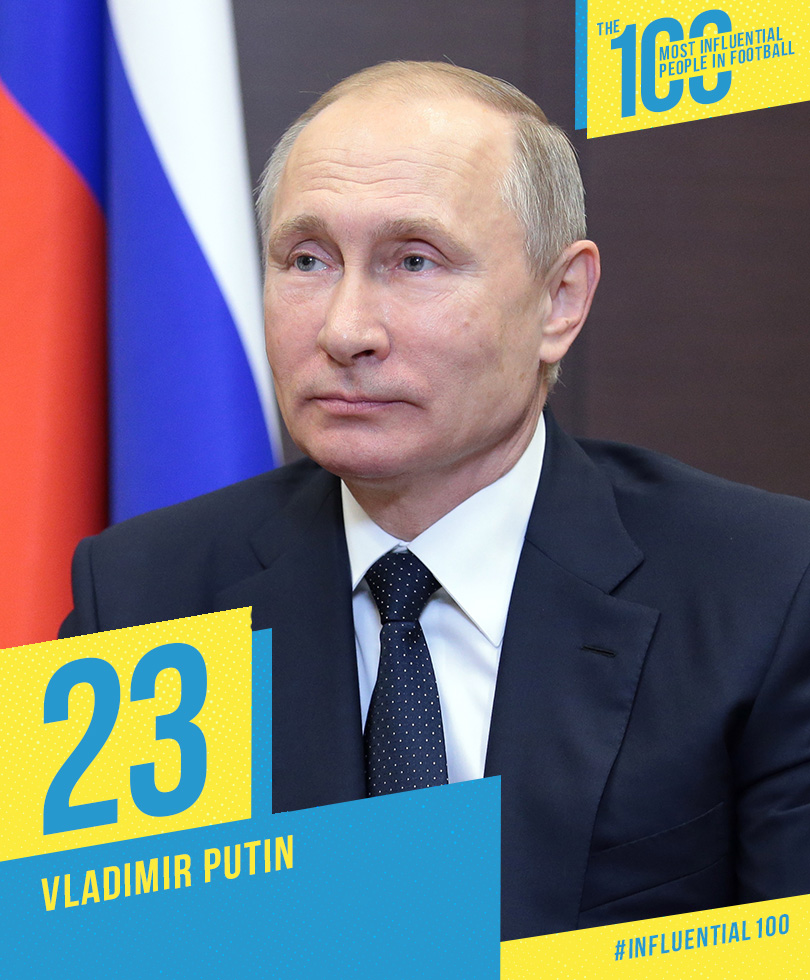
Naturally a figure of huge importance, given that next year’s World Cup will take place in Russia. President Putin was a significant figure in securing the competition, but with the tournament just over a year away he will hold great sway over its tone.
Russia’s geopolitical climate remains less than stable, presenting a range of troubling hypotheticals, but the more immediate concerns relate to Putin’s apparent indifference to issues of social equality – the rights of LGBT people remain apparently low on his agenda, for example, and Russian football itself has a dreadful record for race-based discrimination. Violence also threatens to tarnish the next World Cup and those fears haven’t been assuaged by Putin’s light-hearted response to the hooliganism that blighted Euro 2016.
How he chooses to lead his country into the event will likely define how well he runs. Clearly, he has work to do in that department. SSB
22. Marina Granovskaia
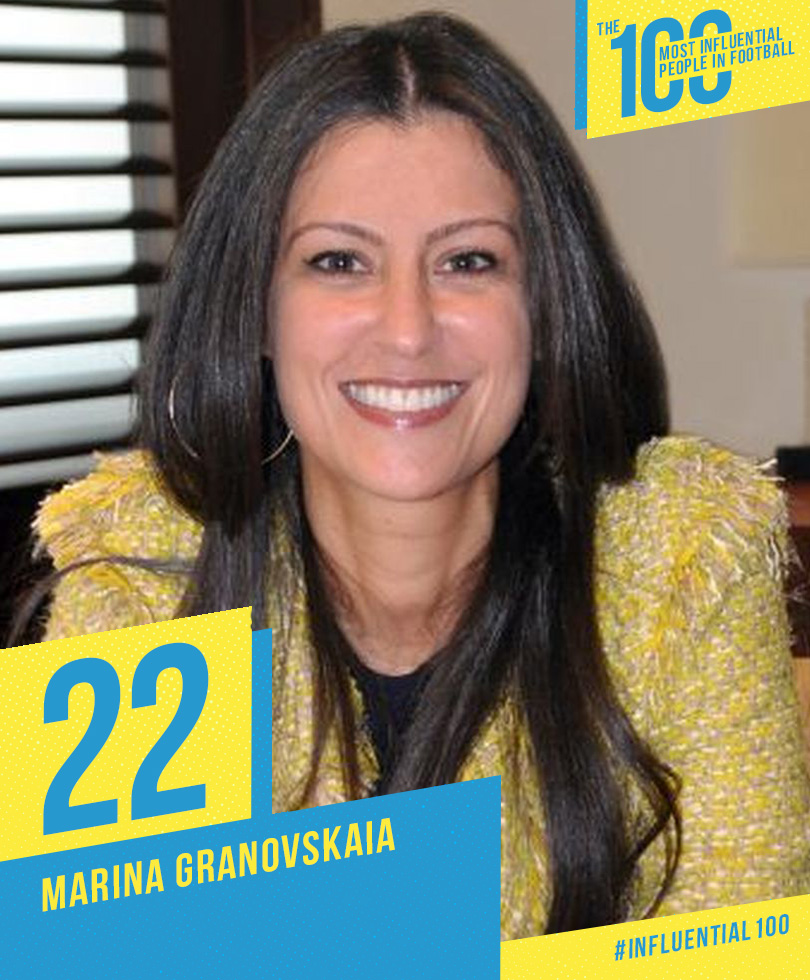
Like her boss Roman Abramovich, Granovskaia tends to do her power broking away from the spotlight. Officially listed as a director at Chelsea, Granovskaia is chief executive in all but name, taking a leading – and famously cut-throat – role in negotiating any big-money deal done by the club.
Granovskaia rose through the ranks at Sibneft, Abramovich’s oil company in Russia, before being recruited to London when he bought Chelsea in 2003. She has spent the ensuing 14 years growing in prominence not just within the club but in the wider football world.
As well as playing a central role in bringing back Jose Mourinho to Stamford Bridge in 2013, the 42-year-old has been crucial in establishing the club’s canny and ferociously effective transfer policy, which involves hoarding youngsters to sell when their value peaks and shifting certain A-listers for well above the market rate.
It might sound simple enough, but it’s a model that’s been forged through razor-sharp business acumen, a binder full of contacts and fierce negotiating skills. It’s a far cry from the cash-splashing modus operandi that defined Abramovich’s early years, and Chelsea’s owner has his compatriot to thank for today’s more maintainable setup. AH
21. Barney Francis
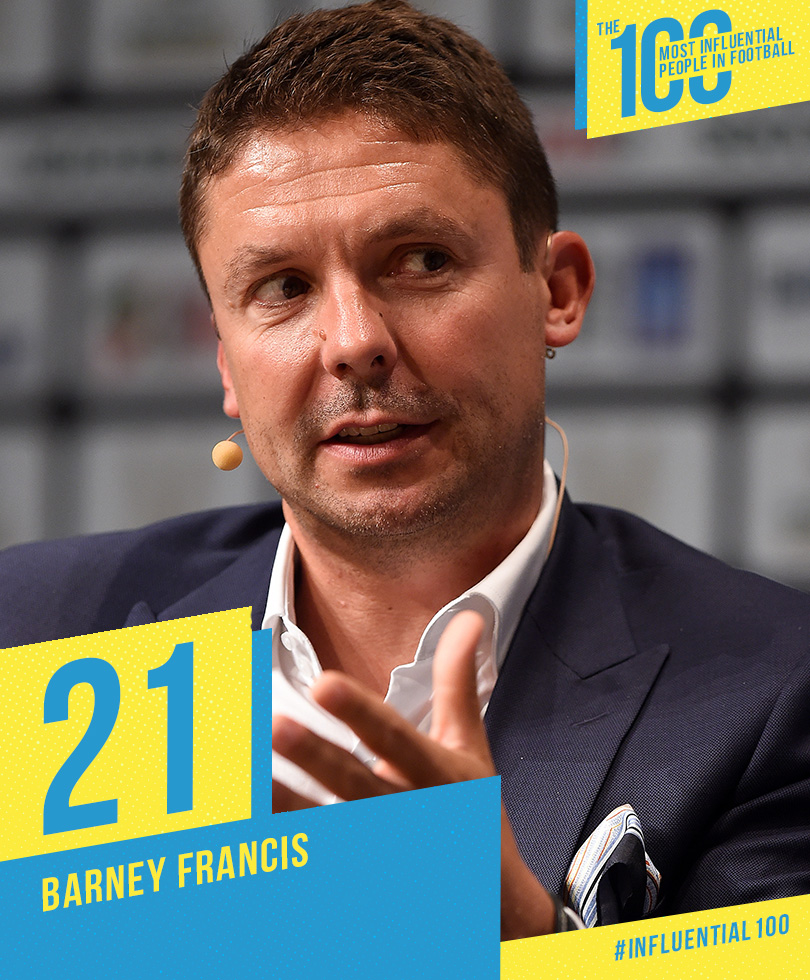
As managing director of Sky Sports, Francis has been key to the broadcaster’s change in tone – but most importantly, integral to the company shelling out a record-breaking £4.2bn for the right to cover Premier League matches from 2016-19 (an 83% upturn on the same bidding process three years prior).
The on-screen product today may not be to everyone’s tastes, but it is preferable to the 1990s laddishness typified by Richard Keys and Andy Gray – and, of course, the circumstances surrounding their departure.
Francis was also at the heart of the decision to relaunch Monday Night Football, employing Gary Neville to great success and eventually in allowing Jamie Carragher to join him. Sky Sports has certainly evolved under his watch.
Less positive have been the recent drop in viewing figures for Premier League games and the realisation that, as was inevitable, Sky have overpaid for their share of the rights (£330m according to analysts back at the time of the deal). How Sky copes with that going forward, and whether it finds a solution to the viewing alternatives which now exist – legal or otherwise – will largely depend on him. SSB
100-91 • 90-81 • 80-71 • 70-61 • 60-51 • 50-41 • 40-31 • 30-21 • 20-11 • 10-1
Joe was the Deputy Editor at FourFourTwo until 2022, having risen through the FFT academy and been on the brand since 2013 in various capacities.
By weekend and frustrating midweek night he is a Leicester City fan, and in 2020 co-wrote the autobiography of former Foxes winger Matt Piper – subsequently listed for both the Telegraph and William Hill Sports Book of the Year awards.
